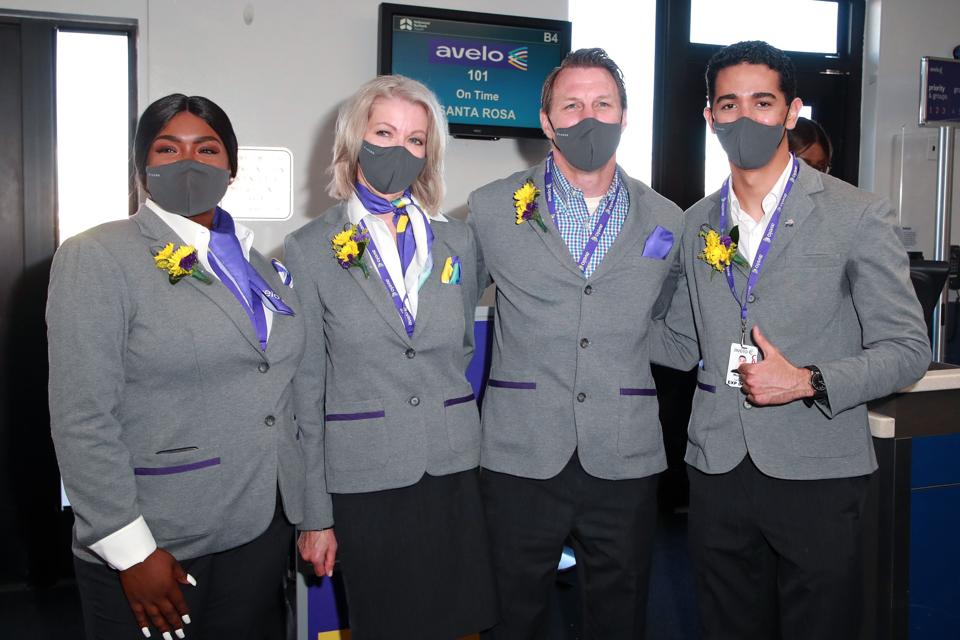Avelo Airlines appears to be in trouble. The four-year-old domestic low-fare airline this week announced it is closing its West Coast base at Burbank Airport (BUR) and will soon be shutting down its West Coast services.
It gives me no pleasure to write these words, as I was literally there at the beginning. In April 2021, I was a passenger on Avelo Flight 101, from Burbank to Charles M. Schulz–Sonoma County Airport (STS) in Sonoma, California. The crowd loved the first flight to California wine company, and the enthusiasm from the pilots, flight attendants, employees and Avelo’s founder and CEO Andrew Levy, who was onboard.
The start-up was the first new airline in the United States in 15 years. Avelo began with three used Boeing 737-800 aircraft; today it has 21.
Until now, Avelo’s startup story was inspirational. That first flight on April 28, 2021, was deep within the COVID-19 pandemic that pounded the airline industry. To launch the new carrier, Avelo employees worked remotely from Florida, Texas, California, New York, and other locations via Microsoft Teams.
Many did have years of airline experience, like CEO Andrew Levy, co-founder and former president of low-cost carrier Allegiant Airlines, and former chief financial officer of United. But many others were new to the airline industry. To train dozens of new flight attendants in safety and other critical on-board skills, Avelo created NBA-like COVID-free “bubbles” so each new class could be quarantined together.
Why launch during a pandemic? At the time, CEO Levy said, “Demand is coming back quickly.”
And according to a July 9, 2025, Avelo press release, “Avelo has flown more than 7.4 million Customers on nearly 60,000 flights. Today Avelo serves 53 cities spanning 21 states and Puerto Rico, as well as three international destinations: Jamaica, Mexico and the Dominican Republic.”
Avelo recently announced it is extending its East Coast flight schedule through mid-February 2026, with one way-fares starting at $37.
But this week CEO Levy announced, ‘Avelo is closing its base at Hollywood Burbank Airport (BUR) later this year. On August 12, 2025, we will reduce our BUR operation to one aircraft before exiting the remaining aircraft on December 2, 2025, and closing the base.
“This was not an easy decision. Our company’s deepest operational roots are in BUR, having launched our first flight there over four years ago during the COVID pandemic. There is rarely one singular reason why decisions like this are made, and this one is no different. We believe the continuation of service from BUR in the current operating environment will not deliver adequate financial returns in a highly competitive backdrop. We intend to redeploy these BUR aircraft to business areas where we see more efficient longer-term growth prospects, while also building depth and breadth to our East Coast operation.”
Levy, who was not available for an interview, concluded, “We appreciate our Crewmembers in California for their hard work and dedication, and all will be given the opportunity to transfer to another Avelo base. We are deeply grateful for the support from the local community and from our business partners. Customers who have flights booked can visit the Manage Trips section of our website to cancel their flight and receive a refund.”
Avelo added 17% additional capacity in 2025. Unfortunately, in 2025 domestic leisure air travel demand has dropped, with fares cut, flights cut, and now airlines like Avelo cutting service. As David Neeleman, CEO of competitive low-cost carrier Breeze Airways, said in March “Your first needs are food and shelter. And then we’re a little bit down the list of expenditures. If you don’t have a job, you’re not going to go buy an airline ticket.”
Credit and debit card spending on airline purchases fell 7.2% in February 2025, while the stocks of many publicly traded US airlines (Avelo is private) fell. American Airlines is down 29%, UAL is down 9%, and Delta is down 8%.
Still, such well-established carriers have significant cash reserves and can even go to the bond market to raise money. But according to Cranky Flier Avelo Airlines had just $23 million in cash and short-term investments at the end of 2024. As the publication noted, “With demand tanking, you have to be very concerned about the future of your business if you’re running Avelo.”
Avelo’s financial problems led to what proved a controversial move by the airline. It accepted government contracts with ICE to fly deportation flights for undocumented migrants.
The backlash against the flights, which began out of Mesa, Arizona, in May, was fierce. More than 19,000 people in Connecticut signed a petition pledging not to fly Avelo, while local officials threatened to revoke financial incentives provided to the airline. A New Hampshire state representative raised money to put up billboards reading “Does your vacation support their deportation?” which devolved into a court battle.
Even the New York Times attacked the beleagured airline for “aiding Trump’s deportation campaign,” helpfully pointing out that Avelo serves “liberal cities on the coasts.”
Has the low-cost airline built enough good will with its low-cost flight to popular destinations to survive these financial and reputational reverses? As a paying customer on flights to wine country, I will certainly miss Avelo’s on-time service out of Burbank. But refocusing on the denser Eastern seaboard routes, including its popular Florida flights, may be enough to keep this low-cost contender going.

